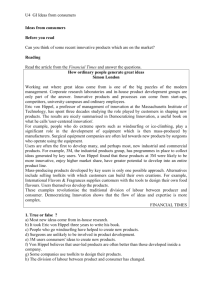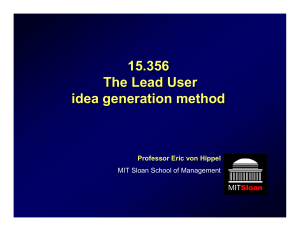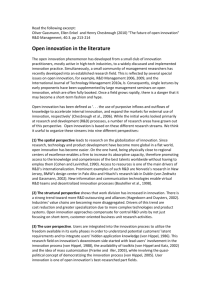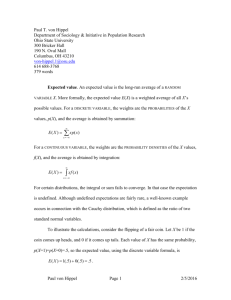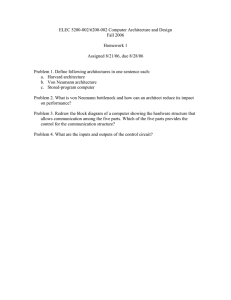Innovation & Economics Bibliography | Research References
advertisement
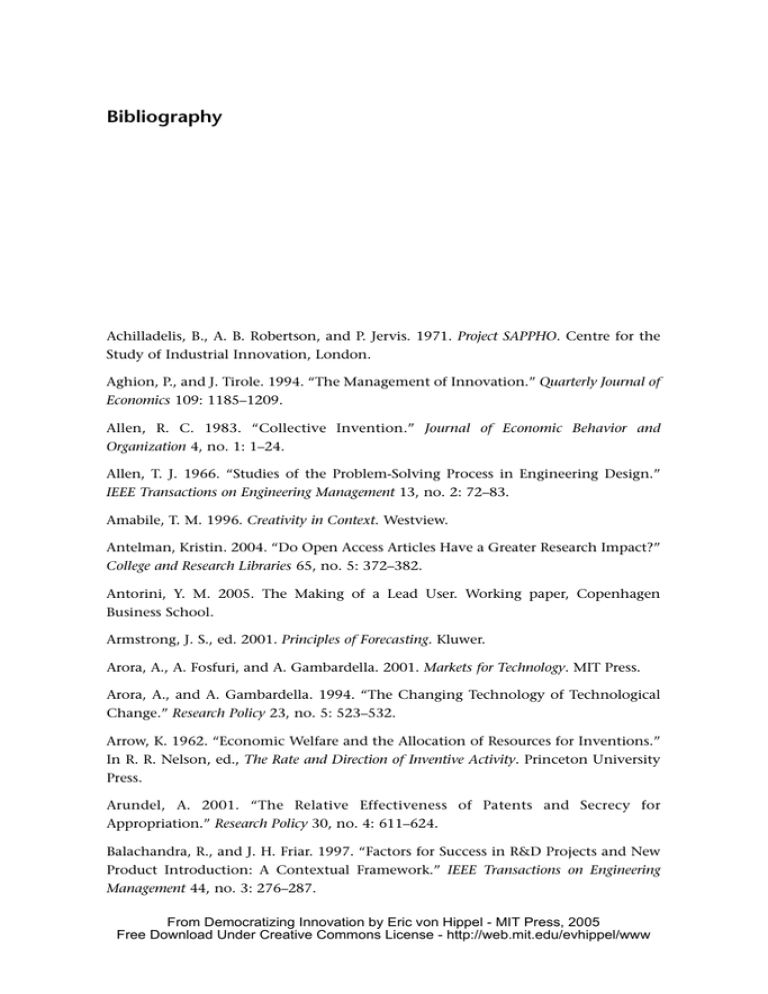
Bibliography Achilladelis, B., A. B. Robertson, and P. Jervis. 1971. Project SAPPHO. Centre for the Study of Industrial Innovation, London. Aghion, P., and J. Tirole. 1994. “The Management of Innovation.” Quarterly Journal of Economics 109: 1185–1209. Allen, R. C. 1983. “Collective Invention.” Journal of Economic Behavior and Organization 4, no. 1: 1–24. Allen, T. J. 1966. “Studies of the Problem-Solving Process in Engineering Design.” IEEE Transactions on Engineering Management 13, no. 2: 72–83. Amabile, T. M. 1996. Creativity in Context. Westview. Antelman, Kristin. 2004. “Do Open Access Articles Have a Greater Research Impact?” College and Research Libraries 65, no. 5: 372–382. Antorini, Y. M. 2005. The Making of a Lead User. Working paper, Copenhagen Business School. Armstrong, J. S., ed. 2001. Principles of Forecasting. Kluwer. Arora, A., A. Fosfuri, and A. Gambardella. 2001. Markets for Technology. MIT Press. Arora, A., and A. Gambardella. 1994. “The Changing Technology of Technological Change.” Research Policy 23, no. 5: 523–532. Arrow, K. 1962. “Economic Welfare and the Allocation of Resources for Inventions.” In R. R. Nelson, ed., The Rate and Direction of Inventive Activity. Princeton University Press. Arundel, A. 2001. “The Relative Effectiveness of Patents and Secrecy for Appropriation.” Research Policy 30, no. 4: 611–624. Balachandra, R., and J. H. Friar. 1997. “Factors for Success in R&D Projects and New Product Introduction: A Contextual Framework.” IEEE Transactions on Engineering Management 44, no. 3: 276–287. From Democratizing Innovation by Eric von Hippel - MIT Press, 2005 Free Download Under Creative Commons License - http://web.mit.edu/evhippel/www 184 Bibliography Baldwin, C. Y., and K. B. Clark. 2003. Does Code Architecture Mitigate Free Riding in the Open Source Development Model? Working paper, Harvard Business School. Barnes, B., and D. Ulin. 1984. “Liability for New Products.” AWWA Journal, February: 44–47. Baron, J. 1988. Thinking and Deciding. Cambridge University Press. Behlendorf, B. 1999. “Open Source as a Business Strategy.” In C. Dibona, S. Ockman, and M. Stone, eds., Open Sources. O’Reilly. Benkler, Y. 2002. “Intellectual Property and the Organization of Information Production.” International Review of Law and Economics 22, no. 1: 81–107. Bessen, J. 2003. Patent Thickets. Working paper, Research on Innovation and Boston University School of Law. Bessen, J. 2004. Open Source Software. Working paper, Research on Innovation. Bessen, J., and R. M. Hunt. 2004. An Empirical Look at Software Patents. Working paper, Federal Reserve Bank of Philadelphia. Bijker, Wiebe. 1995. Of Bicycles, Bakelites and Bulbs. MIT Press. Boldrin, M., and D. Levine. 2002. “The Case against Intellectual Property.” AEA Papers and Proceedings, May: 209–212. Bresnahan, T. F., and S. Greenstein. 1996a. “Technical Progress and Co-Invention in Computing and in the Uses of Computers.” Brookings Papers on Economic Activity. Microeconomics 1996: 1–77. Bresnahan, T. F., and S. Greenstein. 1996b. “The Competitive Crash in Large-Scale Commercial Computing.” In R. Landau, T. Taylor, and G. Wright, eds., The Mosaic of Economic Growth. Stanford University Press. Bresnahan, T. F., and G. Saloner. 1997. “‘Large Firms’ Demand for Computer Products and Services: Market Models, Inertia, and Enabling Strategic Change.” In D. B. Yoffie, ed., Competing in the Age of Digital Convergence. Harvard Business School Press. Brooks, P. F., Jr. 1979. The Mythical Man-Month. Addison-Wesley. Brown, J. S., and P. Duguid. 1991. “Organizational Learning and Communities-ofPractice: Toward a Unified View of Working, Learning, and Innovation.” Organization Science 2, no. 1: 40–57. Brown, T. C., P. A. Champ, R. C. Bishop, and D. W. McCollum. 1996. “Which Response Format Reveals the Truth about Donations to a Public Good.” Land Economics 72, no. 2: 152–166. Buenstorf, G. 2002. “Designing Clunkers: Demand-Side Innovation and the Early History of Mountain Bike.” In J. S. Metcalfe and U. Cantner, eds., Change, Transformation and Development. Physica. Bibliography 185 Chamberlin, E. H. 1950. “Product Heterogeneity and Public Policy.” American Economic Review 40, no. 2: 85–92. Christensen, C. M. 1997. The Innovator’s Dilemma. Harvard Business School Press. Cohen, W. M., A. Goto, A. Nagata, R. R. Nelson, and J. P. Walsh. 2002. “R&D Spillovers, Patents and the Incentives to Innovate in Japan and the United States.” Research Policy 31 (8–9): 1349–1367. Cohen, W. M., and D. A. Levinthal. 1990. “The Implications of Spillovers for R&D Investment and Welfare: A New Perspective.” Administrative Science Quarterly 35: 128–152. Cohen, W. M., R. R. Nelson, and J. P. Walsh. 2000. Protecting Their Intellectual Assets. Working paper, National Bureau of Economic Research. Coller, M., and T. L. Yohn. 1998. “Management Forecasts: What Do We Know?” Financial Analysts Journal 54, no. 1: 58–62. Connell, J. L., and L. B. Shafer. 1989. Structured Rapid Prototyping. Prentice-Hall. Conner, K. R., and C. K. Prahalad. 1996. “A Resource-Based Theory of the Firm: Knowledge versus Opportunism.” Organization Science 7, no. 5: 477–501. Cook, T. D., and D. T. Campbell. 1979. Quasi-Experimentation. Houghton Mifflin. Csikszentmihalyi, M. 1975. Beyond Boredom and Anxiety. Jossey-Bass. Csikszentmihalyi, M. 1990. Flow. Harper and Row. Csikszentmihalyi, M. 1996. Creativity. HarperCollins. Dam, K. W. 1995. “Some Economic Considerations in the Intellectual Property Protection of Software.” Journal of Legal Studies 24, no. 2: 321–377. Danneels, Erwin. 2004. “Disruptive Technology Reconsidered: A Critique and Research Agenda.” Journal of Product Innovation Management 21: 246–258. Dasgupta, P., and P. A. David. 1994. “Toward a New Economics of Science.” Policy Research 23: 487–521. David, P. A. 1992. “Knowledge, Property, and the System Dynamics of Technological Change.” Proceedings of the World Bank Annual Conference on Development Economics 1992: 215–247. David, P. A. 1998. Knowledge Spillovers, Technology Transfers, and the Economic Rationale for Public Support of Exploratory Research in Science. Background paper for European Committee for Future Accelerators. de Fraja, G. 1993. “Strategic Spillovers in Patent Races.” International Journal of Industrial Organization 11, no. 1: 139–146. 186 Bibliography Dellarocas, C., N. F. Awad, and X. (M. ) Zhang. 2004. Exploring the Value of Online Reviews to Organizations. Working paper, MIT Sloan School of Management. Duke, R. 1988. Local Building Codes and the Use of Cost-Saving Methods. US Federal Trade Commission, Bureau of Economics. Efron, B. 1979. “Bootstrap Methods: Another Look at the Jackknife.” Annals of Statistics 7: 1–26. Ehrenkrantz Group. 1979. A Study of Existing Processes for the Introduction of New Products and Technology in the Building Industry. US Institute of Building Sciences. Elrod, T., and A. P. Kelman. 1987. Reliability of New Product Evaluation as of 1968 and 1981. Working paper, Owen Graduate School of Management, Vanderbilt University. Enos, J. L. 1962. Petroleum Progress and Profits. MIT Press. Fleming, L. 2001. “Recombinant Uncertainty in Technological Search.” Management Science 47, no. 1: 117–132. Foray, D. 2004. Economics of Knowledge. MIT Press. Franke, N., and H. Reisinger. 2003. Remaining within Cluster Variance. Working paper, Vienna Business University. Franke, N., and S. Shah. 2003. “How Communities Support Innovative Activities: An Exploration of Assistance and Sharing Among End-Users.” Research Policy 32, no. 1: 157–178. Franke, N., and E. von Hippel. 2003a. Finding Commercially Attractive User Innovations. Working paper, MIT Sloan School of Management. Franke, N., and E. von Hippel. 2003b. “Satisfying Heterogeneous User Needs via Innovation Toolkits: The Case of Apache Security Software.” Research Policy 32, no. 7: 1199–1215. Freeman, C. 1968. “Chemical Process Plant: Innovation and the World Market.” National Institute Economic Review 45, August: 29–57. Friedman, D., and D. McAdam. 1992. “Collective Identity and Activism: Networks, Choices, and the Life of a Social Movement.” In A. D. Morris and C. McClurg, eds., Frontiers in Social Movement Theory. Yale University Press. Gallini, N., and S. Scotchmer. 2002. “Intellectual Property: When Is It the Best Incentive System?” In A. Jaffe, J. Lerner, and S. Stern, eds., Innovation Policy and the Economy, volume 2. MIT Press. Green, P. E. 1971. “A New Approach to Market Segmentation.” Business Horizons 20, February: 61–73. Bibliography 187 Green, P. E., and C. M. Schaffer. 1998. “Cluster-Based Market Segmentation: Some Further Comparisons of Alternative Approaches.” Journal of the Market Research Society 40, no. 2: 155–163. Hall, B. H., and R. Ham Ziedonis. 2001. “The Patent Paradox Revisited: An Empirical Study of Patenting in the US Semiconductor Industry, 1979–1995.” RAND Journal of Economics 32, no. 1: 101–128. Hall, B. H., and D. Harhoff. 2004. “Post-Grant Reviews in the US Patent System: Design Choices and Expected Impact.” Berkeley Law Technology Journal, in press. Harhoff, D. 1996. “Strategic Spillovers and Incentives for Research and Development.” Management Science 42, no. 6: 907–925. Harhoff, D., J. Henkel, and E. von Hippel. 2003. “Profiting from Voluntary Information Spillovers: How Users Benefit by Freely Revealing Their Innovations.” Research Policy 32, no. 10: 1753–1769. Hecker, F. 1999. “Setting Up Shop: The Business of Open Source Software.” IEEE Software 16, no. 1: 45–51. Heller, M. A. 1998. “The Tragedy of the Anticommons: Property in the Transition from Marx to Markets.” Harvard Law Review 111: 621–688. Heller, M. A., and R. S. Eisenberg. 1998. “Can Patents Deter Innovation? The Anticommons in Biomedical Research.” Science Magazine 280 (5364): 698–701. Henkel, J. 2003. “Software Development in Embedded Linux: Informal Collaboration of Competing Firms.” In W. Uhr, W. Esswein, and E. Schoop, eds., Proceedings der 6. Internationalen Tagung Wirtschaftsinformatik 2003, volume 2. Physica. Henkel, J. 2004a. The Jukebox Mode of Innovation. Discussion paper, CEPR. Henkel, J. 2004b. Patterns of Free Revealing. Working paper, University of Munich. Henkel, J., and S. Thies. 2003. “Customization and Innovation: User Innovation Toolkits for Simulator Software.” In Proceedings of the 2003 Congress on Mass Customization and Personalization (MCPC 2003), Munich. Henkel, J., and E. von Hippel. 2005. “Welfare Implications of User Innovation.” Journal of Technology Transfer 30, no. 1/2: 73–87. Herstatt, C., and E. von Hippel. 1992. “From Experience: Developing New Product Concepts via the Lead User Method.” Journal of Product Innovation Management 9, no. 3: 213–222. Hertel, G., S. Niedner, and S. Herrmann. 2003. “Motivation of Software Developers in Open Source Projects: An Internet-Based Survey of Contributors to the Linux Kernel.” Research Policy 32, no. 7: 1159–1177. 188 Bibliography Hienerth, C. 2004. “The Commercialization of User Innovations: Sixteen Cases in an Extreme Sporting Industry.” In Proceedings of the 26th R&D Management Conference, Sesimbra, Portugal. Hirschleifer, J. 1971. “The Private and Social Value of Information and the Reward to Inventive Activity.” American Economic Review 61, no. 4: 561–574. Hollander, S. 1965. The Sources of Increased Efficiency. MIT Press. Horwich, M. 1982. Clipped Wings. MIT Press. Hunt, R. M., and J. Bessen. 2004. “The Software Patent Experiment.” Business Review, Federal Reserve Bank of Philadelphia Q3: 22–32. Jensen, M. C., and W. H. Meckling. 1976. “Theory of the Firm: Managerial Behavior, Agency Costs, and Ownership Structure.” Journal of Financial Economics 3, no. 4: 305–360. Jeppesen, L. B. 2004. Profiting from Innovative User Communities. Working paper, Department of Industrial Economics and Strategy, Copenhagen Business School. Jeppesen, L. B. 2005. “User Toolkits for Innovation: Users Support Each Other.” Journal of Product Innovation Management, forthcoming. Jeppesen, L. B., and M. J. Molin. 2003. “Consumers as Co-developers: Learning and Innovation Outside the Firm.” Technology Analysis and Strategic Management 15, no. 3: 363–84. Jokisch, M. 2001. Open Source Software-Entwicklung: Eine Analyse des Geschäftsmodells der STATA Corp. Master’s thesis, University of Munich. Ketchen, D. J., Jr., and C. L. Shook. 1996. “The Application of Cluster Analysis in Strategic Management Research: An Analysis and Critique.” Strategic Management Journal 17, no. 6: 441–459. Knight, K. E. 1963. A Study of Technological Innovation: The Evolution of Digital Computers. PhD dissertation, Carnegie Institute of Technology. Kollock, P. 1999. “The Economies of Online Cooperation: Gifts and Public Goods in Cyberspace.” In M. A. Smith and P. Kollock, eds., Communities in Cyberspace. Routledge. Kotabe, M. 1995. “The Return of 7-Eleven . . . from Japan: The Vanguard Program.” Columbia Journal of World Business 30, no. 4: 70–81. Kristensen, P. S. 1992. “Flying Prototypes: Production Departments’ Direct Interaction with External Customers.” International Journal of Operations and Production Management 12, no. 2: 195–211. Lakhani, K. 2005. Distributed Coordination Practices in Free and Open Source Communities. PhD thesis, Massachusetts Institute of Technology. Bibliography 189 Lakhani, K. R., and E. von Hippel. 2003. “How Open Source Software Works: ‘Free’ User-to-User Assistance.” Research Policy 32, no. 6: 923–943. Lakhani, K. R., and B. Wolf. 2005. “Why Hackers Do What They Do: Understanding Motivation and Effort in Free/Open Source Software Projects.” In J. Feller, B. Fitzgerald, S. Hissam, and K. R. Lakhani, eds., Perspectives on Free and Open Source Software. MIT Press. Lerner, J., and J. Tirole. 2002. “Some Simple Economics of Open Source.” Journal of Industrial Economics 50, no. 2: 197–234. Lessig, L. 2001. The Future of Ideas. Random House. Lettl, C., C. Herstatt and H. Gemünden. 2004. The Entrepreneurial Role of Innovative Users. Working paper, Technical University, Berlin. Levin, R. C., A. Klevorick, R. R. Nelson, and S. G. Winter. 1987. “Appropriating the Returns from Industrial Research and Development.” Brookings Papers on Economic Activity 3: 783–820. Levy, S. 1984. Hackers. Doubleday. Lilien, G. L., P. D. Morrison, K. Searls, M. Sonnack, and E. von Hippel. 2002. “Performance Assessment of the Lead User Idea-Generation Process for New Product Development.” Management Science 48, no. 8: 1042–1059. Lim, K. 2000. The Many Faces of Absorptive Capacity. Working paper, MIT Sloan School of Management. Lindsey, G., and G. Knaap. 1999. “Willingness to Pay for Urban Greenway Projects.” Journal of the American Planning Association 65, no. 3: 297–313. Loomis, J., T. Brown, B. Lucero, and G. Peterson. 1996. “Improving Validity Experiments of Contingent Valuation Methods: Results of Efforts to Reduce the Disparity of Hypothetical and Actual Willingness to Pay.” Land Economics 72, no. 4: 450–461. Lüthje, C. 2003. “Customers as Co-Inventors: An Empirical Analysis of the Antecedents of Customer-Driven Innovations in the Field of Medical Equipment.” In Proceedings of the 32th EMAC Conference, Glasgow. Lüthje, C. 2004. “Characteristics of Innovating Users in a Consumer Goods Field: An Empirical Study of Sport-Related Product Consumers.” Technovation 24, no. 9: 683–695. Lüthje, C., C. Herstatt, and E. von Hippel. 2002. The Dominant Role of Local Information in User Innovation: The Case of Mountain Biking. Working Paper, MIT Sloan School of Management. Machlup, F. 1962. Knowledge Production and Distribution in the United States. Princeton University Press. 190 Bibliography Mansfield, E. 1968. Industrial Research and Technological Innovation. Norton. Mansfield, E. 1985. “How Rapidly Does New Industrial Technology Leak Out?” Journal of Industrial Economics 34: 217–223. Mansfield, E., J. Rapoport, A. Romeo, S. Wagner and G. Beardsley. 1977. “Social and Private Rates of Return from Industrial Innovations.” Quarterly Journal of Economics 91, no. 2: 221–240. Mansfield, E., A. Romeo, M. Schwartz, D. Teece, S. Wagner and P. Brach. 1982. Technology Transfer, Productivity, and Economic Policy. Norton. Mansfield, E., and S. Wagner. 1975. “Organizational and Strategic Factors Associated With Probabilities of Success in Industrial R&D.” Journal of Business 48, no. 2: 179–198. Marples, D. L. 1961. “The Decisions of Engineering Design.” IRE Transactions on Engineering Management, June: 55–71. Martin, J. 1991. Rapid Application Development. Macmillan. Matthews, J. 1985. Public Access to Online Catalogs, second edition. Neal-Schuman. Maurer, S. 2005. “Inside the Anticommons: Academic Scientists’ Struggle to Commercialize Human Mutations Data, 1999–2001.” Research Policy, forthcoming. Mead, C., and L. Conway. 1980. Introduction to VLSI Systems. Addison-Wesley. Means, R. S. 1989. Building Construction Cost Data 1989. R. S. Means. Merges, R., and R. R. Nelson. 1990. “On the Complex Economics of Patent Scope.” Columbia Law Review 90: 839–916. Merton, R. K. 1973. The Sociology of Science. University of Chicago Press. Meyer, M. H., and L. Lopez. 1995. “Technology Strategy in a Software Products Company.” Journal of Product Innovation Management 12, no. 4: 194–306. Milligan, G. W., and M. C. Cooper. 1985. “An Examination of Procedures for Determining the Number of Clusters in a Data Set.” Psychometrica 45: 159–179. Mishina, K. 1989. Essays on Technological Evolution. PhD thesis, Harvard University. Mitchell, R. C., and R. T. Carson. 1989. Using Surveys to Value Public Goods. Resources for the Future. Moerke, K. A. 2000. “Free Speech to a Machine.” Minnesota Law Review 84, no. 4: 1007–1008. Mollick, E. 2004. Innovations from the Underground: Towards a Theory of Parasitic Innovation. Master’s thesis, Massachusetts Institute of Technology. Mountain Bike. 1996. Mountain Biking Skills. Rodale. Bibliography 191 Morrison, P. D., J. H. Roberts, and D. F. Midgley. 2004. “The Nature of Lead Users and Measurement of Leading Edge Status.” Research Policy 33, no. 2: 351–362. Morrison, P. D., J. H. Roberts, and E. von Hippel. 2000. “Determinants of User Innovation and Innovation Sharing in a Local Market.” Management Science 46, no. 12: 1513–1527. Muñiz, A. M., Jr., and T. C. O’Guinn. 2001. “Brand Community.” Journal of Consumer Research 27: 412–432. Muñiz, A. M., Jr., and H. J. Schau. 2004. When the Consumer Becomes the Marketer. Working paper, DePaul University. Myers, J. H. 1996. Segmentation and Positioning for Strategic Marketing Decisions. American Marketing Association. National Sporting Goods Association. 2002. Sporting Goods Market in 2001. Neil, H., R. Cummings, P. Ganderton, G. Harrison, and G. McGuckin. 1994. “Hypothetical Surveys and Real Economic Commitments.” Land Economics 70: 145–154. Nelson, R. R. 1982. “The Role of Knowledge in R&D Efficiency.” Quarterly Journal of Economics 97, no. 3: 453–470. Nelson, R. R. 1990. What Is Public and What Is Private About Technology? Working paper, Consortium on Competitiveness and Cooperation, University of California, Berkeley. Nelson, R. R. 1993. National Innovation Systems: A Comparative Analysis. Oxford University Press. Nuvolari, A. 2004. “Collective Invention during the British Industrial Revolution: The Case of the Cornish Pumping Engine.” Cambridge Journal of Economics 28, no. 3: 347–363. Ogawa, S. 1998. “Does Sticky Information Affect the Locus of Innovation? Evidence from the Japanese Convenience-Store Industry.” Research Policy 26, no. 7–8: 777–790. Oliver, P. E. 1980. “Rewards and Punishment as Selective Incentives for Collective Action: Theoretical Investigations.” American Journal of Sociology 85: 1356–1375. Oliver, P. E., and G. Marwell. 1988. “The Paradox of Group Size in Collective Action: A Theory of the Critical Mass II.” American Sociological Review 53, no. 1: 1–18. Olson, E. L., and G. Bakke. 2001. “Implementing the Lead User Method in a High Technology Firm: A Longitudinal Study of Intentions versus Actions.” Journal of Product Innovation Management 18, no. 2: 388–395. Olson, M. 1967. The Logic of Collective Action. Harvard University Press. 192 Bibliography O’Mahony, S. 2003. “Guarding the Commons: How Open Source Contributors Protect Their Work.” Research Policy 32, no. 7: 1179–1198. Ostrom, E. 1998. “A Behavioral Approach to the Rational Choice Theory of Collective Action.” American Political Science Review 92, no. 1: 1–22. Pavitt, K. 1984. “Sectoral Patterns of Technical Change: Towards a Taxonomy and a Theory.” Research Policy 13 (6): 343–373. Penning, C. 1998. Bike History. Delius & Klasing. Perens, B. 1999. “The Open Source Definition.” In C. DiBona, S. Ockman, and M. Stone, eds., Opensources. O’Reilly. Pinch, T., and R. Kline. 1996. “Users as Agents of Technological Change. The Social Construction of the Automobile in Rural America.” Technology and Culture 37: 763–795. Pinch, T. J., and W. E. Bijker. 1987. “The Social Construction of Facts and Artifacts.” In W. Bijker, T. Hughes, and T. Pinch, eds., The Social Construction of Technological Systems. The MIT Press. Pine, J. B. II. 1993. Mass Customization. Harvard Business School Press. Polanyi, M. 1958. Personal Knowledge. University of Chicago Press. Poolton, J., and I. Barclay. 1998. “New Product Development: From Past Research to Future Applications.” Industrial Marketing Management 27: 197–212. Porter, M. E. 1991. Competitive Advantage of Nations. Free Press. Prügl, R., and N. Franke. 2005. Factors Impacting the Success of Toolkits for User Innovation and Design. Working paper, Vienna University of Economics. Punj, G., and D. W. Stewart. 1983. “Cluster Analysis in Marketing Research: Review and Suggestions for Application.” Journal of Marketing Research 20, May: 134–148. Raymond, E., ed. 1996. The New Hacker’s Dictionary, third edition. MIT Press. Raymond, E. 1999. The Cathedral and the Bazaar. O’Reilly. Redmond, W. H. 1995. “An Ecological Perspective on New Product Failure: The Effects of Competitive Overcrowding.” Journal of Product Innovation Management 12: 200–213. Riggs, W., and E. von Hippel. 1994. “Incentives to Innovate and the Sources of Innovation: The Case of Scientific Instruments.” Research Policy 23, no. 4: 459–469. Rogers, E. M. 1994. Diffusion of Innovation, fourth edition. Free Press. Rosenberg, N. 1976. Perspectives on Technology. Cambridge University Press. Rosenberg, N. 1982. Inside the Black Box. Cambridge University Press. Bibliography 193 Rothwell, R., C. Freeman, A. Horsley, V. T. P. Jervis, A. B. Roberts, and J. Townsend. 1974. “SAPPHO Updated: Project SAPPHO Phase II.” Research Policy 3, no. 3: 258–291. Saloner, G., and W. E. Steinmueller. 1996. Demand for Computer Products and Services in Large European Organizations. Research paper, Stanford Graduate School of Business. Sattler, H. 2003. “Appropriability of Product Innovations: An Empirical Analysis for Germany.” International Journal of Technology Management 26, no. 5–6: S. 502–516. Schmookler, J. 1966. Invention and Economic Growth. Harvard University Press. Schrage, M. 2000. Serious Play. Harvard Business School Press. Schreier, M., and N. Franke. 2004. Value Creation by Self-Design. Working paper, Vienna University of Economics. Seip, K., and J. Strand. 1992. “Willingness to Pay for Environmental Goods in Norway: A Contingent Valuation Study with Real Payment.” Environmental and Resource Economics 2: 91–106. Shah, S. 2000. Sources and Patterns of Innovation in a Consumer Products Field. Working paper, MIT Sloan School of Management. Shah, S., and M. Tripsas. 2004. When Do User-Innovators Start Firms? Working paper, University of Illinois. Shapiro, C. 2001. “Navigating the Patent Thicket: Cross Licenses, Patent Pools, and Standard Setting.” In A. Jaffe, J. Lerner, and S. Stern, eds., Innovation Policy and the Economy, volume 1. MIT Press. Simon, E. 1996. “Innovation and Intellectual Property Protection: The Software Industry Perspective.” Columbia Journal of World Business 31, no. 1: 30–37. Slater, Stanley F., and Narver, John C. 1998. “Customer-Led and Market-Oriented: Let’s Not Confuse the Two.” Strategic Management Journal 19, no. 1:1001–1006. Slaughter, S. 1993. “Innovation and Learning during Implementation: A Comparison of User and Manufacturer Innovations.” Research Policy 22, no. 1: 81–95. Smith, A. 1776. An Inquiry into the Nature and Causes of the Wealth of Nations. Modern Library edition. Random House, 1937. Spence, M. 1976. “Product Differentiation and Welfare.” American Economic Review 66, no. 2, Papers and Proceedings: 407–414. Taylor, C. T., and Z. A. Silberston. 1973. The Economic Impact of the Patent System. Cambridge University Press. Taylor, M., and S. Singleton. 1993. “The Communal Resource: Transaction Costs and the Solution of Collective Action Problems.” Politics and Society 21, no. 2: 195–215. 194 Bibliography Tedd, L. A. 1994. “OPACs through the Ages.” Library Review 43, no. 4: 27–37. Teece, D. J. 1977. “Technology Transfer by Multinational Firms: The Resource Cost of Transferring Technological Know-How.” Economic Journal 87: 242–261. Thomke, S. H. 1998. “Managing Experimentation in the Design of New Products.” Management Science 44, no. 6: 743–762. Thomke, S. H. 2003. Experimentation Matters. Harvard Business School Press. Thomke, S. H., and E. von Hippel. 2002. “Customers as Innovators: A New Way to Create Value.” Harvard Business Review 80, no. 4: 74–81. Thomke, S. H., E. von Hippel, and R. Franke. 1998. “Modes of Experimentation: An Innovation Process—and Competitive—Variable.” Research Policy 27, no. 3: 315–332. Tirole, J. 1988. The Theory of Industrial Organization. MIT Press. Tull, D. 1967. “The Relationship of Actual and Predicted Sales and Profits in New Product Introductions.” Journal of Business 40: 233–250. Tyre, M., and E. von Hippel. 1997. “Locating Adaptive Learning: The Situated Nature of Adaptive Learning in Organizations.” Organization Science 8, no. 1: 71–83. Urban, G. L., and E. von Hippel. 1988. “Lead User Analyses for the Development of New Industrial Products.” Management Science 34, no. 5: 569–82. Utterback, J. M., and W. J. Abernathy. 1975. “A Dynamic Model of Process and Product Innovation.” Omega 3, no. 6: 639–656. van der Plas, R., and C. Kelly. 1998. The Original Mountain Bike Book. MBI. Varian, H. R. 2002. “New Chips Can Keep a Tight Rein on Consumers.” New York Times, July 4. von Hippel, E. 1976. “The Dominant Role of Users in the Scientific Instrument Innovation Process.” Research Policy 5, no. 3: 212–39. von Hippel, E. 1977. “Transferring Process Equipment Innovations from UserInnovators to Equipment Manufacturing Firms.” R&D Management 8, no. 1:13–22. von Hippel, E. 1986. “Lead Users: A Source of Novel Product Concepts.” Management Science 32, no. 7: 791–805. von Hippel, E. 1988. The Sources of Innovation. Oxford University Press. von Hippel, E. 1994. “Sticky Information and the Locus of Problem Solving: Implications for Innovation.” Management Science 40, no. 4: 429–439. von Hippel, E. 1998. “Economics of Product Development by Users: The Impact of Sticky Local Information.” Management Science 44, no. 5: 629–644. Bibliography 195 von Hippel, E. 2001. “Perspective: User Toolkits for Innovation.” Journal of Product Innovation Management 18: 247–257. von Hippel, E., and S. N. Finkelstein. 1979. “Analysis of Innovation in Automated Clinical Chemistry Analyzers.” Science and Public Policy 6, no. 1: 24–37. von Hippel, E., N. Franke, and R. Prügl. 2005. Screening vs. Pyramiding. Working paper, MIT Sloan School of Management. von Hippel, E., and R. Katz. 2002. “Shifting Innovation to Users via Toolkits.” Management Science 48, no. 7: 821–833. von Hippel, E., S. H. Thomke, and M. Sonnack. 1999. “Creating Breakthroughs at 3M.” Harvard Business Review 77, no. 5: 47–57. von Hippel, E., and M. Tyre. 1995. “How ‘Learning by Doing’ is Done: Problem Identification in Novel Process Equipment.” Research Policy 24, no. 1: 1–12. von Hippel, E., and G. von Krogh. 2003. “Open Source Software and the “PrivateCollective” Innovation Model: Issues for Organization Science.” Organization Science 14, no. 2: 209–223. von Krogh, G., and S. Spaeth. 2002. Joining, Specialization, and Innovation in Open Source Software Development. Working paper, University of St. Gallen. von Krogh, G., S. Haefliger and S. Spaeth. 2004. The Practice of Knowledge Reuse in Open Source Software. Working paper, University of St. Gallen. Wellman, B., J. Boase, and W. Chen. 2002. The Networked Nature of Community On and Off the Internet. Working paper, Centre for Urban and Community Studies, University of Toronto. Wenger, E. 1998. Communities of Practice. Cambridge University Press. Wayner, P. 2000. Free for All. Harper Business. Weber, S. 2004. The Success of Open Source. Harvard University Press. Willis, K. G., and N. A. Powe. 1998. “Contingent Valuation and Real Economic Commitments: A Private Good Experiment.” Journal of Environmental Planning and Management 41, no. 5: 611–619. Wind, Y. 1978. “Issues and Advances in Segmentation Research.” Journal of Marketing Research 15, August: 317–337. Winter, S. G., and G. Szulanski. 2001. “Replication as Strategy.” Organization Science 12, no. 6: 730–743. Young, G., K. G. Smith, and C. M. Grimm. 1996. “Austrian and Industrial Organization Perspectives on Firm Level Competitive Activity and Performance.” Organization Science 7, no. 3: 243–254.
